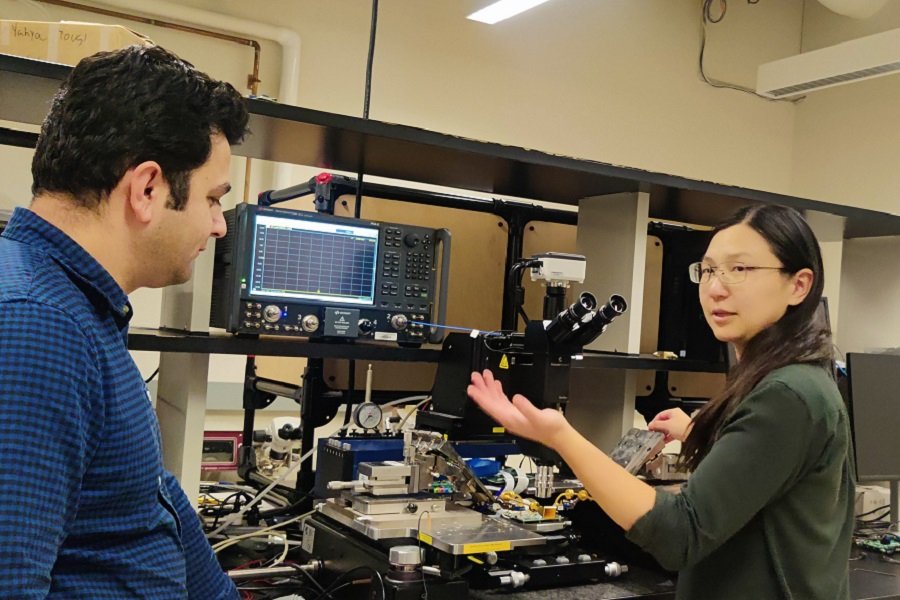Wen Zhou receives doctoral dissertation fellowship and Early Innovation Fund award

Doctoral candidate Wen Zhou is the recipient of two competitive awards: the doctoral dissertation fellowship for 2023-2024 by the University of Minnesota Graduate School, and the Early Innovation Fund award. Zhou is working on her dissertation titled "Distributed mmWave Radar System for Localization and Imaging" under the guidance of Professor Yahya Tousi.
Zhou’s research interests broadly lie within the area of sensing circuits and systems design. Her doctoral work focuses on creating design solutions for low-power, high-precision distributed integrated radar sensing systems. High-resolution distributed radar systems have the unique ability to capture detailed images of terrains that are unattainable by a single radar unit. Such a distributed system of sensors could be significant to a range of applications including self-driving vehicles, manufacturing, robotics, and security. The demand for these applications drives the exploration of optimal hardware designs that can enable distributed radar sensing in the most scalable fashion while also tackling existing implementation challenges.
A key objective in advancing high-resolution integrated radar technology is to develop integrated circuit designs that operate with minimal power consumption, process data swiftly, and allow for collaborative operations. Existing radar sensors adopt one of two primary radar sensing techniques: frequency-modulated continuous-wave (FMCW) modulation or digital phase modulation (PM). Both present challenges. While FMCW radars are easy to implement and efficient in their power consumption, they have long time delays and are not suitable for collaborative sensing applications. Digital PM-based radars on the other hand offer low time delay but at the cost of high power consumption and heightened susceptibility to noise.
Zhou’s research has sought to overcome these challenges by exploring novel integrated radar architectures based on phase modulation. With the co-design of circuit architecture (hardware) and radar signal processing algorithms (software), her design reduces hardware complexity, introduces digital reconfigurability, and ultimately enhances the overall sensing performance. Having successfully built and demonstrated a proof-of-concept that overcomes the existing challenges, she is on track to develop a collaborative radar sensor system based on the new design and explore its industrial applications.
In summer 2023 Zhou received an Early Innovation award for her project “mmWave Distributed Radar Sensing System” that stems from her doctoral research. The award will help support the development of a minimum viable product ready for demonstration.
About Wen Zhou
Wen Zhou received her bachelor’s degree in instrumentation and control engineering from Nanjing University of Aeronautics and Astronautics and her master’s degree in electrical engineering from the University of Minnesota under the supervision of Professor Rhonda Franklin. She has interned with Skyworks Solutions, Keysight Technologies, Samsung Semiconductor with roles spanning from RF module design, RFIC design to mmWave system architecture design. Her research interests include sensing circuits and systems, and mmWave IC design. She is a recipient of the Chinese National Scholarship, NUAA Outstanding Graduate Award, UMN ECE Department Fellowship, Cadence Women in Technology Scholarship, and RFIC travel award.
When asked what drives her, Zhou says, "My research interest centers around the design of sensing circuits and systems. I hold a strong belief in the futuristic vision of a smart society where an individual can benefit from an average of a thousand sensors. However, the realization of such a society is hindered by the substantial financial and energy costs associated with the mass deployment of these sensors. There are multiple approaches to address this challenge. Firstly, we can focus on designing sensors that are highly integrated, thereby making both manufacturing costs and power consumption more affordable. Additionally, we can work on making these sensors adaptive and intelligent, allowing them to serve multiple purposes across various scenarios without the need for redesigns. My overall career goal is to facilitate the progression towards a “smart” society by offering architectural-level design solutions for sensing applications and exploring innovative design methodologies for rapid prototyping at the integrated circuit level.
The Early Innovation Fund is a competitive funding program open to all University researchers including faculty, postdocs, graduate students, and staff. It funds short-term projects that advance early-stage innovations and is designed to help advance the technology readiness of an innovation through several means, including support for materials or resources, access to services, expertise or personnel, dissemination or implementation of innovations to generate user feedback, and entrepreneurial exploration.